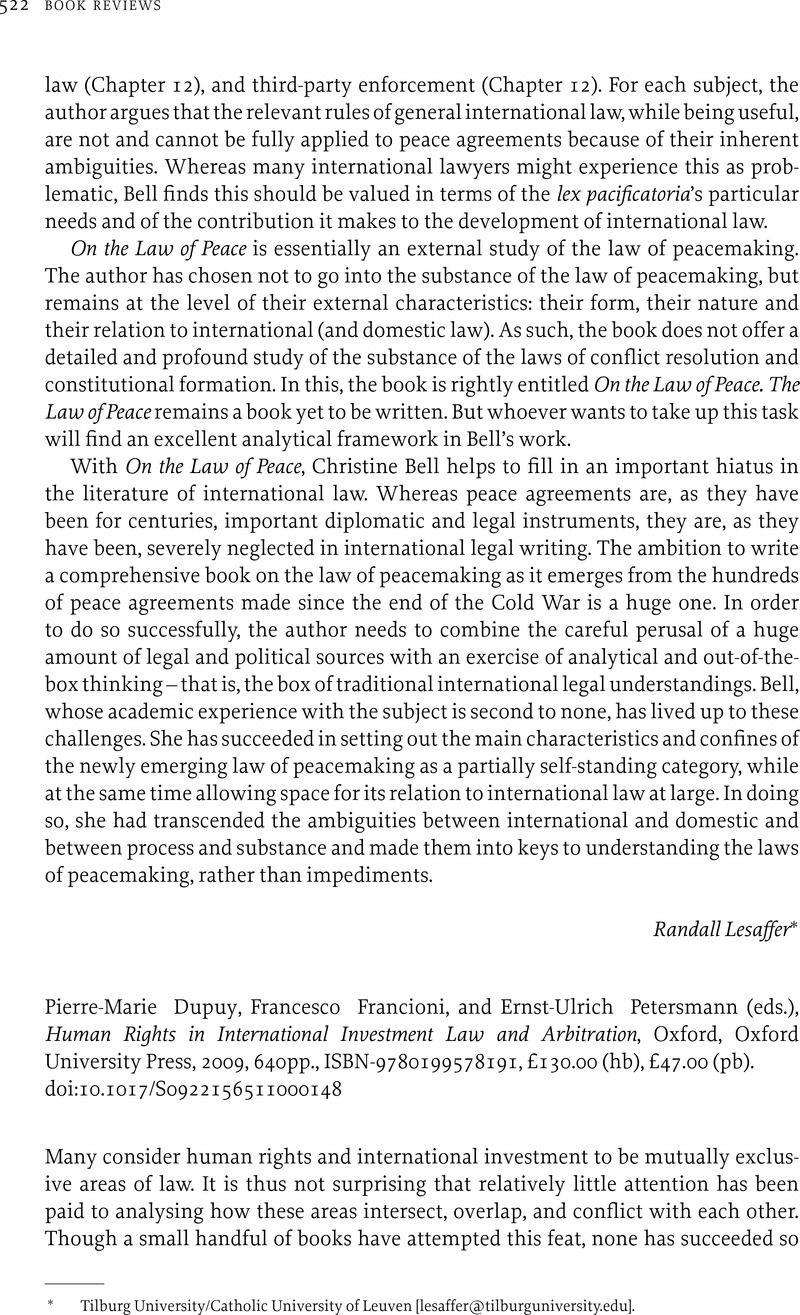No CrossRef data available.
Published online by Cambridge University Press: 06 May 2011

1 Petersmann uses the term ‘constitution’ to refer to the legal framework that defines the common rules for ensuring equal freedoms under the rule of law and the set-up of the institutions and decision-making processes that make, administer, and enforce the rules. See E.-U. Petersmann, ‘How to Constitutionalize International Law and Foreign Policy for the Benefit of Civil Society?’, (1998) 20 Mich. JIL 1, at 12.
2 As Petersmann notes, the precise content of the concept of ‘judicial administration of justice’ in international economic law is controversial when different dimensions of justice (i.e., procedural justice, distributive justice, and corrective justice) collide. Human rights, he suggests, can help resolve this dilemma.
3 E.g., the clause in the investment treaty governing the scope of the arbitral tribunal's jurisdiction or the national constitutional legal framework of the state may necessitate the consideration of national or international law in an international investment dispute.
4 See VCLT, Art. 31(3)(c). See also ICSID Convention, Art. 42: ‘the Tribunal shall apply . . . such rules of international law as may be applicable.’
5 See Statute of the International Court of Justice, Art. 38(1)(c).
6 Investment arbitration functions as a review mechanism that assesses the regulatory actions of states, particularly in relation to public-interest regulations. Decisions of investment tribunals may also influence ex ante the behaviour of states when it comes to enacting future public-interest regulations. For these reasons, investment arbitration has been analogized to a system of global governance. See generally B. Kingsbury and S. Schill, ‘Investor–State Arbitration as Governance: Fair and Equitable Treatment, Proportionality and the Emerging Global Administrative Law’, New York University School of Law Public Law & Legal Theory Research Paper Series Working Paper No. 09-46 (2009).
7 For a thorough discussion of this topic, see generally D. Schneiderman, Constitutionalizing Economic Globalization: Investment Rules and Democracy's Promise (2008).
8 The ability of investment tribunals to review and assess a state's human-rights regulations that interfere with investments can compromise a state's ability to protect human rights and can create a regulatory chill. Threats to human-rights issues have already arisen in investment disputes relating to water services and affirmative-action policies. For a thorough discussion of these issues, see L. E. Peterson, Human Rights and Investment Treaties: Mapping the Role of Human Rights Law within Investor–State Arbitration (2009).
9 E.g., ideas for constructing an appellate mechanism for investment disputes are discussed in G. Van Harten, Investment Treaty Arbitration and Public Law (2007), 152.
10 The investor-friendly approach of many tribunals is aptly described by the Noble Ventures tribunal, which noted that it is not permissible to interpret investment-treaty clauses exclusively in favour of investors, ‘as is too often done regarding BITs’; see Noble Ventures Inc. v. Romania, ICSID Case No ARB/01/11, Award, 12 October 2005, at para. 52.